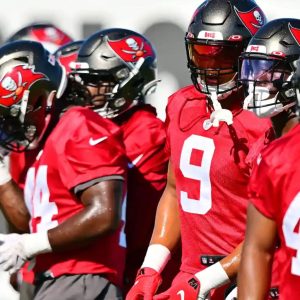As the NFL free agency period approaches, the situation surrounding Tampa Bay Buccaneers’ star wide receiver Mike Evans has become one of the most closely watched stories. Evans, through his agent Deryk Gilmore, has made his desires clear: he seeks to play with an elite quarterback in a system that maximizes his talents, aspires to be compensated among the top receivers in the league, and emphasizes winning a Super Bowl as a pivotal goal. This declaration sets a significant tone for his journey into free agency and underscores the high stakes involved for both Evans and potential suitors.

Evans’ stance reflects a broader trend in the NFL, where top-tier talent increasingly seeks to align with situations that not only offer financial rewards but also competitive advantages. His refusal to play with a rookie quarterback is a notable preference, highlighting his desire for an established, high-caliber teammate under center—a factor that significantly narrows the field of potential destinations. This preference for an elite quarterback partner underscores a seasoned athlete’s pursuit of excellence and championship aspirations.
Just spoke with Mike Evans’ agent, @DerykGilmore, who says: “Mike wants to play with an elite quarterback in an offense that will showcase him — and be paid like a top wide receiver. He doesn’t want to play with a rookie QB. Winning a Super Bowl is a key priority.”
Evans is… https://t.co/HUC7dmlIWd
— Jordan Schultz (@Schultz_Report) March 2, 2024
The Buccaneers faced a critical juncture with a soft deadline to extend Evans’ contract by February 19th, a deadline that has passed without an agreement. According to Jordan Schultz of Bleacher Report, the two sides remain significantly divided, with Tampa Bay now poised to absorb $7.4 million in dead money for 2024 due to the impasse. This financial implication for the Buccaneers adds another layer of complexity to the negotiations, signaling a challenging road ahead in retaining their star receiver.
The looming free agency for Evans marks a pivotal moment in his career and for the franchises vying for his services. His demands place him among the upper echelon of NFL wide receivers, not just in terms of skill and production on the field but also in terms of market value. This situation echoes the broader dynamics of the NFL’s player movement era, where athletes wield significant power in shaping their careers and futures.
Evans’ track record speaks volumes. As a pivotal figure in the Buccaneers’ offense, his consistency and productivity have been hallmarks of his tenure with the team. His desire to be showcased in an offense tailored to his strengths speaks to a player keenly aware of his value and the impact he can have on a team’s Super Bowl aspirations. The emphasis on winning the Super Bowl is particularly telling, reflecting a maturity and a hunger for success that transcends individual accolades.
As negotiations continue and free agency looms, the NFL community watches closely (especially the Chiefs). The outcome of Evans’ situation will not only affect his career trajectory and the Buccaneers’ fortunes but also signal to players and teams alike about the evolving landscape of player empowerment, contract negotiations, and the pursuit of championships in the league.
In essence, Mike Evans stands at a crossroads that mirrors the current state of the NFL—where talent, ambition, and the quest for success in a team sport intersect with the individual’s pursuit of recognition, financial security, and, ultimately, a legacy defined by victories on the grandest stage. As this story unfolds, it will undoubtedly add another chapter to the ever-evolving narrative of professional football, player agency, and the intricate dance between star athletes and the franchises that seek to harness their talents toward mutual success.





